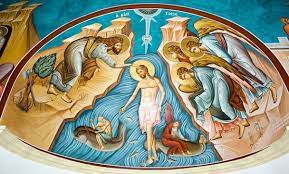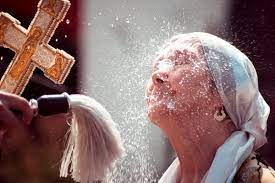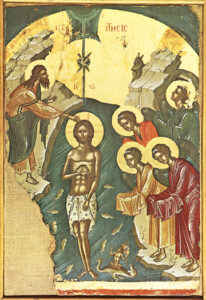Did you ever have a mental roadblock – like I had last week? I intended to write about the Flight into Egypt. I had much material gathered and many interesting images, and I just couldn’t put it all together. Maybe next week?
Therefore out of the files I’ve pulled up Post 46, written please note on the day before Epiphany, January 5, 2018.
In Greece tomorrow morning the churches will be filled to overflowing, as also I presume in other traditional Orthodox countries. A Lutheran pastor tells me that on the Epiphany in Germany, schools and libraries are closed (he’s a scholar who tried to get in), though he says few go to church. But in America… well, I don’t have to tell you. The liturgical forms of the Holy Orthodox Church make it clear that the Epiphany is at least equal to Christmas. Roman Catholics, Anglicans and Lutherans also consider it a major feast. But very few attend Epiphany services. Ask Americans today about the feast of the Epiphany and I’d bet 95 out of 100 would say, “Huh..?”

The Epiphany, the Lord’s manifestation to the world – often called the Theophany, the manifestation of God. In the West the Epiphany is the feast of the Three Kings. With us Orthodox it is the more powerful celebration of Christ’s Baptism, the first public manifestation of Christ to the world, The Christmas celebration which began on December 25 leads up to this great climax, the Epiphany, the beginning of Christ’s mission to mankind, his first revelation of himself.
So how did we lose the Epiphany?
I wrote about this a few week ago, but I’ll repeat for the sake of those who had no time to tune in here because of the pre-Christmas rush. And that is exactly the problem. For Orthodox and most Western Christians as well, the period before December 25 is intended to be a quiet time of preparation. Now we have been secularized and have joined the pre-Christmas shopping and partying extravaganza. So December 26, instead of the Second Day of the Christmas celebration, is now the First Day of the Big Let-down. We wind ourselves up again briefly for the civil New Year and its parties and a gazillion bowl games (when I was young there only four, the proper number…), and then people take their “holiday” decorations down, and it’s all over. When we finally come to the Epiphany, the culmination of the Church’s celebration… Forget it. We are wiped out. We’re done.
I feel the same way. We can’t help it in our culture. And up here in the northland (where this year it has been nasty cold since Christmas), it is so tempting to just hole up. But, brothers and sisters, can we try to do it the Church’s way? Come to the Epiphany celebration. The services are long, I know, with Saint Basil’s Liturgy and the Great Blessing of Water, but they’re beautiful. Furthermore, Epiphany includes my second most favorite priestly activity, which is to soak people with holy water. No trifling sprinkles  here. Some Orthodox folks take off their glasses or grimace, but others hold up their faces to the blessed water with smiles on their faces. I love that.
here. Some Orthodox folks take off their glasses or grimace, but others hold up their faces to the blessed water with smiles on their faces. I love that.
But the most important reason not to ignore the feast is because if we’re not careful the great themes of Epiphany will be lost, and we will be (no, we already are) much the poorer for it. As follows:
1 The Revelation of the True God
“When You, O Lord, were baptized in the Jordan, the worship of the Trinity was made manifest, for the voice of the Father bore witness to You, and called You His beloved Son. And the Spirit, in the form of a dove, confirmed the truthfulness of His word. O Christ, our God, You have revealed Yourself and have enlightened the world. Glory to You!” (Troparion for the Epiphany)
The Epiphany is our guard against worshiping a false god of our own making. The true God has revealed himself to us, beginning in the Old Testament, culminating with the revelation in Jesus Christ. Who ever would have invented belief in the Holy Trinity? the revelation of one God united in equal tri-personal love? But he has become the foundational image of the Church, of family, of society. The first full revelation of the Holy Trinity came with Christ’s Baptism in the Jordan.
2 Holy Baptism: Repentance and Renewal
Now Christ is manifest to the world not only as a sweet little baby but as the God-Man – come to save us, call us to repentance, turn us around, change our minds and our lives, to baptize us into a new kind of life, and to call us to follow him, even to the cross. He comes now to make us over, renew us, make us clean again, recreate us. Generation after generation, he takes people one by one, born into this messed up mortal fallen world, and he gives us a new beginning. Or to use the image of a pre-Epiphany Troparion, “to clothe us. And you, O Adam, rejoice with the first mother and hide not yourselves as you did of old in Paradise, for having seen you naked, Christ has appeared to clothe you with the first robe. Truly Christ has appeared, desiring to renew the whole creation.”
“You, O Adam” – that’s you, me, us. The word “Adam” is the generic word for man, mankind, all human beings. We human beings long ago hid ourselves from God, turned away from God, lost our natural unity with God and our perpetual awareness of him. And thus we got thrown out of Eden, our original natural innocent happiness. Ever since then it’s as if we’ve been naked, unprotected, cold, and it’s been killing us, literally. We’ve been subject to that which God never desired for us: death. God gave Adam and Eve “clothing of skins”, Genesis says, interim make-do garments – we’re speaking in spiritual terms here.
But now Christ has come to truly clothe us, to give us the warmth and protection of the Spirit. The early Christians were baptized one by one, individually, outdoors, naked at night – that’s why they had deaconesses, to baptize women – as a sign of our condition. And then immediately as they came up out of the cold dark water, they were clothed in white robes and led directly into the church, which was filled with candlelight and the light and warmth of the community. As they marched in, all sang (as we still do on the Epiphany and other ancient Baptismal days), “As many as have been baptized into Christ have put on Christ”. In Baptism Christ clothes us with himself: he is our warmth, our protection, our life. The Kontakion today has Christ saying: “I have truly come to save Adam, the first to be created.” Adam, mankind who went astray.

Taking John’s Baptisn of repentance as a beginning, Christ expanded it and made it also a Baptism into the Holy Spirit, a Baptism into new power, new grace, into new and eternal life. Baptism is our entrance into eternal life. And Christ is the new Adam – this is one of Saint Paul’s favorite themes – the new Adam who reverses what happened to mankind long ago. “As in Adam all died, so in Christ shall all be made alive.”
Baptism is new birth into eternal life, and that guarantees exactly what natural birth guarantees – nothing, unless it is fed and nurtured so it can grow and mature. What’s required if we are to grow and mature in eternal life is that we never turn away from Jesus Christ, from his family the Church. We’re all works in progress. Each of us is a “10,000 year project”. God’s gift of everlasting life means simply that if we stick with him and not give up on him no matter what, then he won’t give up on us, not even when we die. As the holy old monk said just before he died, “I have only begun to repent”. And now he has been given the time to finish. God will give us all the time we need to finish the project of being recreated, remade.
3 The Renewal of the World
But there’s more. Christ came to remake not only each of us personally but all of his creation. This is the third great theme of the feast of the Epiphany, and one which we Orthodox are in particular danger of losing. As the Troparion concludes: “Truly, Christ has appeared, desiring to renew the whole creation.” The fathers taught that all creation, the whole order of nature, the environment we now sometimes call it, has fallen on evil times. Nature also in some mysterious way has turned away from God. Nature, like us, is no longer natural. Saint Paul wrote that the whole creation groans, awaiting its redemption, and Christ has come to recreate all things.
He began by becoming a material physical human being, so that in him matter begins to be taken up into the life of God. He began his ministry by being immersed in the waters, that “element”, so to speak, which is found in all places and without which there can be no physical life. The Church ever since has blessed not only people but things: water, bread, wine, oil, animals, lakes, rivers, oceans.
At Epiphany, each Orthodox community is instructed to go outside and bless the waters by immersing the Holy Cross three times. Then the tradition, where the weather is suitable, is that men dive after a Cross and recover it. I think this is just for the fun of it. Here is the ceremony on a cold day from somewhere in Greece:
In Russia where the weather is definitely not suitable, they dive in anyway! or immerse themselves three times to renew their  Baptisms. Lord, have mercy.
Baptisms. Lord, have mercy.
We at Saint Nicholas, Cedarburg, are more restrained, or is it weak? We process over (sometimes, if it’s very cold, we drive over) to our nearest body of water, Cedar Creek, and immerse the holy Cross of Christ from off the bridge into whatever patch of open water we can find in our cold climate. (The first year we did this, seven geese appeared and landed on the water!) And we bless the waters of the world.
“The world?” Yes. The blessed molecules of water of Cedar Creek flow into the Milwaukee River, out into Lake Michigan, over Niagara Falls and into Lake Ontario, then into the Saint Lawrence River and out into the Atlantic, and after that God only knows where. Not to mention the molecules that evaporate into the atmosphere and into the water cycle and fall as water or snow, or that disappear into the caverns and caves of the earth and emerge as springs or are pumped up for human use. Orthodox have been blessing the waters of rivers and lakes and seas, and for Baptisms (non-Orthodox need to know that every Baptism requires what? about 10 gallons of water?), for 2000 years. So by now surely all water has molecules of holy water. We drink holy water and holy orange juice! We shower in holy water. We swim in holy water. Holy snow falls from the sky. I at my age take special care not to slip on holy ice. And we pollute holy water. All we do now is in the material presence of the Holy.
This is the first step in “Orthodox environmentalism”, the redemption of the material order. (Actually it’s the second step. The first step is the blessing of wine and water and of us material beings.) But the blessing of the waters is only the beginning of renewing the whole order of nature and restoring it to its pristine God-given purity. Let us not leave environmentalism to the secularized liberals, many of whom want us simply to conform to nature, or to the secularized conservatives, many of whom oddly could not care less about conserving nature. We need to base the renewal of the natural world on the Scriptures and on traditional Orthodox theology – which began with God’s command to Adam to be guardian of all things, and came to its culmination with the blessing of the whole created order when Christ blessed the waters by his immersion in the Jordan.
Orthodox environmentalism is the “holy passion” of Ecumenical Patriarch Bartholomew, whom I quoted at length in a Blog post last September [2017]. I notice that few read it. Does that tell us something? And could that possibly be because most of us have been ignoring the feast of Christ’s Epiphany to the world?
Next Week: I’ll take another shot at The Flight into Egypt
Week after next: I haven’t even thought about that yet.